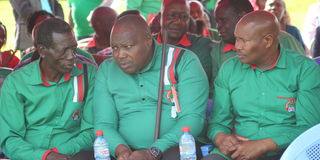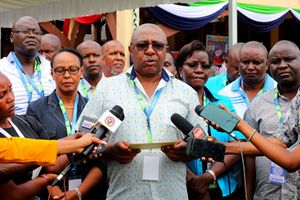
From left: Kenya National Union of Teachers secretary general Mr Collins Oyuu with the union's national chairman Mr Kamau Karinga and the union's first national vice chairman Mr Malel Langat during the burial ceremony of John Sampoti Musere, the Rift Valley Regional Council chairman, at Olereko Village in Kilgoris Constituency, Narok County on May 17,2025.
The cutback on the allocation to the education sector by Sh62 billion in the 2025-2026 financial year budget estimates has rattled the Kenya National Union of Teachers (Knut).
The union has appealed to Parliament to reinstate the funding, failure to which key programmes will be significantly affected.
Knut Secretary-General Collins Oyuu asked Parliament to review the issue, and ensure that the Ministry of Education is not starved of funding.
“Education is the pillar of development in the country and the ministry requires all the money it can possibly get. We are appealing to Parliament and to the Executive arm of the government to review the proposed budgetary allocation,” Mr Oyuu said.
“Money meant for examinations and invigilation has been removed in the budget estimates. This has never happened. We are hopeful that the money, which was omitted, will be reinstated,” he added.
Mr Oyuu spoke at Olereko village in Kilgoris Constituency, Narok County during the burial of Knut Rift Valley Council Chairman John Sampoti Musere. He died after a long illness.
The Knut secretary-general said that education reforms will not be achieved without adequate funding.
“Education affects all facets of the socio-economic and political fabric, thus the need to give it priority in funding. The success or failure of a country is hinged on how seriously a government takes education. We are confident that the President (Dr William Ruto) will step in and restore the funding,” Mr Oyuu said.
Knut National Chairman Kamau Karinga, First National Vice Chairman Malel Langat, First National Woman Representative Mercy Ndung’u, National Trustee Boniface Tenai, and National Executive Committee members Richard Lentayaa, Alice Bor and Sammy Bor echoed Mr Oyuu’s sentiments.
Basic Education Principal Secretary Prof Julius Bitok told the National Assembly Committee on Education chaired by Tinderet Member of Parliament Julius Melly, that the reduction of the Ministry of Education’s budget was done by an official of the National Treasury in a bid to beat a Cabinet deadline.
The PS said that Sh12.5 billion meant for examinations and invigilation, Sh1.8 billion and Sh21.85 billion that was supposed to be for free primary and secondary school capitation, respectively, had not been factored in the budget estimates.
Administering of the Kenya Primary School Education Assessment (KPSEA) exams, Kenya Junior School Education Assessment (KJSEA) and Kenya Certificate of Secondary School Education (KCSE) tests will be adversely affected due to the cuts.
In addition, Sh18.8 billion capitation for junior school and Sh4.2 billion for the school feeding programme have not been factored in the budget. And quality assurance was not allocated any cash.
In the budget proposal, the Teachers Service Commission (TSC) has been allocated Sh387.7 billion, which includes funds for employment of 24,000 teachers in January next year.
President Ruto has said that the government, in the last two years, employed 76,000 teachers — the highest in the history of the education sector.
Dr Ruto has promised the trained P1 teachers who have not been employed for as long as 20 years after they graduated, and most of whom have attained 45 years, that they will be given priority in the next cycle of employment by the TSC.
Education Cabinet Secretary Julius Ogamba earlier revealed that there are 343,485 trained but unemployed teachers, out of which 124,061 are primary school teachers.
Outgoing TSC Chief Executive Officer Dr Nancy Macharia has said that there is a shortage of 98,261 teachers in public schools while the commission had registered 229,410 trained teachers in the last 10 years.
The government is implementing reforms in the education sector premised on the recommendations of the Presidential Working Party on Education Reforms which was chaired by Prof Raphael Munavu, as the 8-4-4 system is being phased out.
The Competency Based Curriculum (CBC) has been renamed the Competency Based Education (CBE) with Junior Secondary School (JSS) becoming Junior School (JS) in the changes being implemented in phases.
A question that has not adequately been answered is whether the JS teachers fall under primary or secondary section.
The Kenya National Union of Teachers and the Kenya Union of Post Primary Education Teachers (Kuppet) have been fighting each other over the membership of the JS teachers.








